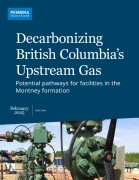British Columbia is attracting and promoting extensive liquefied natural gas (LNG) development, including associated shale gas extraction and processing. Its 2012 LNG strategy targets three export terminals in operation by 2020, but the province's revenue and jobs estimates for LNG development would require five to seven plants.
Despite the province's focus on the liquefaction terminals proposed for the coast, carbon pollution would be released across the LNG supply chain. The processes of extracting, processing, transporting, liquefying and eventually burning natural gas all produce carbon pollution. While three-quarters of that pollution would come from end use combustion, the scope of this report is extraction through liquefaction within B.C., and the infrastructure required to minimize carbon pollution.









